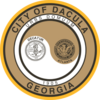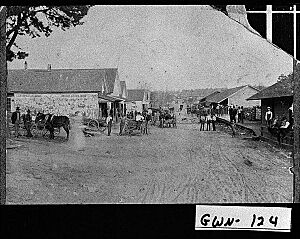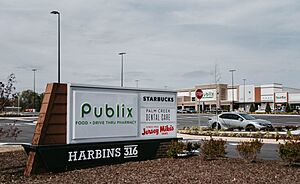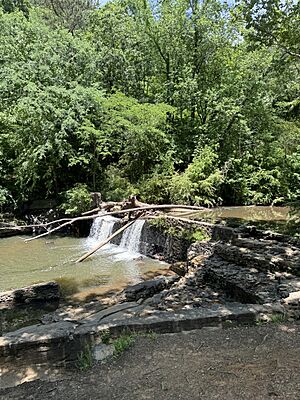Dacula, Georgia facts for kids
Quick facts for kids
Dacula, Georgia
|
|||
|---|---|---|---|
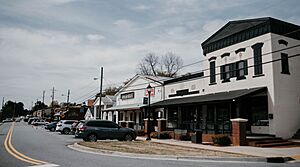
Dacula, Georgia
|
|||
|
|||
| Motto(s):
"Honoring Our Past, Building Our Future "
|
|||
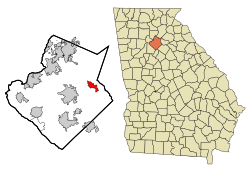
Location in Gwinnett County and the state of Georgia
|
|||
| Country | United States | ||
| State | Georgia | ||
| County | Gwinnett | ||
| Area | |||
| • Total | 5.45 sq mi (14.11 km2) | ||
| • Land | 5.42 sq mi (14.03 km2) | ||
| • Water | 0.03 sq mi (0.08 km2) | ||
| Elevation | 1,122 ft (342 m) | ||
| Population
(2020)
|
|||
| • Total | 6,882 | ||
| • Density | 1,270.68/sq mi (490.65/km2) | ||
| Time zone | UTC-5 (Eastern (EST)) | ||
| • Summer (DST) | UTC-4 (EDT) | ||
| ZIP code |
30019
|
||
| Area code(s) | 770 | ||
| FIPS code | 13-21184 | ||
| GNIS feature ID | 2404173 | ||
Dacula (/dəˈkjuːlə/ də-KEW-lə) is a city in Gwinnett County, Georgia, United States. It is about 37 miles northeast of Atlanta.
In 2010, Dacula had a population of 4,442 people. By 2020, its population grew to 6,882. The Dacula area has some of the oldest buildings in northeast Georgia. One example is the Elisha Winn House, which used to be the courthouse for Gwinnett County.
Contents
Discovering Dacula's Past
The Muscogee (Creek) People
The land where Dacula is now was once part of the Muscogee (Creek) Nation. Much of this land was given to the State of Georgia in the 1790 Treaty of New York. This happened after conflicts known as the Oconee Wars.
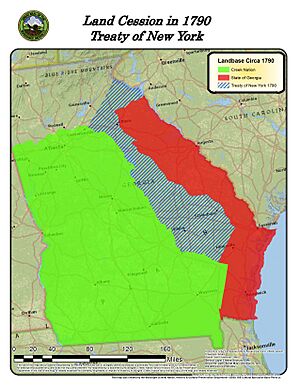
White European settlers began to move into the Dacula area around the time of the War of 1812. For a long time, not many people settled here. This was partly because the Cherokee Nation still lived in parts of Gwinnett County. Later, the Trail of Tears (part of the Indian Removal Act) forced many Native American people to move. This made it easier for more settlers to come to Dacula and other parts of Gwinnett.
From Chinquapin Grove to Dacula
Dacula started in the late 1800s. It was first called Chinquapin Grove. This name came from an old Native American word for a type of dwarf chestnut tree. These trees are no longer found in the area.
The town was renamed "Hoke" in 1891. This was after an executive from the Seaboard Air Line Railroad. However, the Post Office Department did not approve of this name. By 1895, maps showed the town as Dacula instead of Chinquapin Grove.
The name Dacula is believed to come from letters in the names of two nearby cities: Decatur and Atlanta. These cities were already growing when Dacula was founded. Dacula officially became a town in 1905. Some residents were worried that becoming a town would hurt local businesses.
Religion has always been important in Dacula. One of the first churches built was a Methodist Church. It was founded by Rev. R. P. Jackson. The town also had a train station on a CSX line. This station closed in the mid-1950s.
Dacula Today
In 2022, Gwinnett County started a big project called the Rowen Project. This project aims to bring together researchers, business owners, and other creative thinkers. It connects with over 50 research and educational groups across Georgia. The goal is to make Georgia a leader in research.
Since this project began, the Dacula area has seen many changes. More homes and shopping centers have been built. For example, the Harbins 316 development has added many new food and shopping options. Before this, people in this part of Gwinnett County had to drive 30–40 minutes to get groceries.
Even with new national stores, residents are proud of their local gathering spots and traditions. In 2024, a new playground and workout area opened in Maple Creek Park. The town also continues its popular Memorial Day Parade.
Dacula's Location and Area
Dacula is in the eastern part of Gwinnett County. U.S. Route 29 Business/Georgia State Route 8 (Winder Highway) is the main road through the town center. This road goes west 6 miles to Lawrenceville, which is the county seat. It goes east 11 miles to Winder.
U.S. Route 29 (University Parkway) is a larger highway that goes around Dacula to the south. You can get to it from Harbins Road. University Parkway goes east 34 miles to Athens. It goes west 12 miles to Interstate 85, which then leads another 25 miles southwest to Atlanta.
The United States Census Bureau says Dacula covers about 5.0 square miles (12.9 square kilometers). A small part of this, about 0.03 square miles (0.08 square kilometers), is water. The Dacula 30019 ZIP code covers a much larger area than the city limits. This means mail goes to places like Hamilton Mill, which is north of Interstate 85.
Dacula's Population Changes
| Historical population | |||
|---|---|---|---|
| Census | Pop. | %± | |
| 1900 | 120 | — | |
| 1910 | 169 | 40.8% | |
| 1920 | 244 | 44.4% | |
| 1930 | 304 | 24.6% | |
| 1940 | 315 | 3.6% | |
| 1950 | 369 | 17.1% | |
| 1960 | 440 | 19.2% | |
| 1970 | 782 | 77.7% | |
| 1980 | 1,577 | 101.7% | |
| 1990 | 2,217 | 40.6% | |
| 2000 | 3,848 | 73.6% | |
| 2010 | 4,442 | 15.4% | |
| 2020 | 6,882 | 54.9% | |
| U.S. Decennial Census | |||
In 2020, Dacula had 6,882 people living there. There were 1,902 households and 1,529 families.
| Race | Num. | Perc. |
|---|---|---|
| White (non-Hispanic) | 2,942 | 42.75% |
| Black or African American (non-Hispanic) | 1,922 | 27.93% |
| Native American | 11 | 0.16% |
| Asian | 296 | 4.3% |
| Pacific Islander | 1 | 0.01% |
| Other/Mixed | 323 | 4.69% |
| Hispanic or Latino | 1,387 | 20.15% |
Schools and Libraries in Dacula
The Gwinnett County Public Schools system runs the schools in the area. Here are some of the schools that have Dacula mail addresses:
- Alcova Elementary School
- Dacula Elementary School
- Dyer Elementary School
- Fort Daniel Elementary School
- Harbins Elementary School
- Puckett's Mill Elementary School
- Dacula Middle School
- Dacula High School
The Gwinnett County Public Library has two branches nearby. These are the Dacula and Hamilton Mill branches. They are located in the unincorporated area of Hamilton Mill.
Local News in Dacula
Dacula has two newspapers that serve the town. They are the Gwinnett Daily Post, which is based in nearby Lawrenceville, and the Hamilton Mill Neighborhood News.
Parks for Fun and Relaxation
Dacula has many parks where you can play and relax.
Here are some of the parks located in Dacula:
- Dacula Park
- Duncan Creek Park
- Freeman's Mill Park
- Harbins Park
- Little Mulberry Park
- Maple Creek Park
- Olde Mill Park
- Rabbit Hill Park
Famous People from Dacula
Many notable people have connections to Dacula. Here are a few:
- Will Bagrou - a soccer player
- Andrew Booth Jr. - a cornerback for the Minnesota Vikings
- Vanessa Briscoe Hay - a singer
- McClain Hermes - a Paralympic swimmer
- David Irons - a former cornerback for the Atlanta Falcons
- Kenny Irons - a former running back for the Cincinnati Bengals
- Corey Levin - a football player
- Levi Lowrey - a singer-songwriter
- Brittany Rogers (softball) - a softball player
- Donna Sheldon - a politician and founder of Dacula Classical Academy
- Roba Stanley - a country singer
- Gid Tanner - a country singer
- Jason Wisdom - a heavy metal vocalist and guitarist
- Will Hinton - an Olympic Trap Shooter
See also
 In Spanish: Dacula (Georgia) para niños
In Spanish: Dacula (Georgia) para niños
 | Emma Amos |
 | Edward Mitchell Bannister |
 | Larry D. Alexander |
 | Ernie Barnes |



